Attending the inaugural Kaleidoscope conference in Austin last week, I couldn’t shake a strange feeling: I’d been here before. That was impossible, of course, as this was 8am’s very first customer conference. But the energy, the setup, the vibe all felt uncannily familiar. It was, as Yogi Berra might have said, déjà vu all over again.
The two-day event was the first-ever customer conference put on by the company 8am. If you have no idea who or what 8am is, don’t feel out of the loop. The name is barely three weeks old – the new brand identity announced Aug. 19 by the company formerly known as AffiniPay.
That company is the parent of a group of products related to payments and practice management for lawyers and accountants. They include the payments platform LawPay, the practice management platform MyCase, the personal injury platform CasePeer, and the immigration lawyers platform DocketWise.
Further reading: At Its Inaugural Kaleidoscope Conference, 8am’s CPO Announces AI Tools, Platform Integration and More.
Time for An 8am Conference
Producing these types of customer conferences is becoming increasingly common for legal tech companies, much as it is for their general tech counterparts, and so, for 8am, it was only a matter of time (no pun intended) before it staged one of its own.
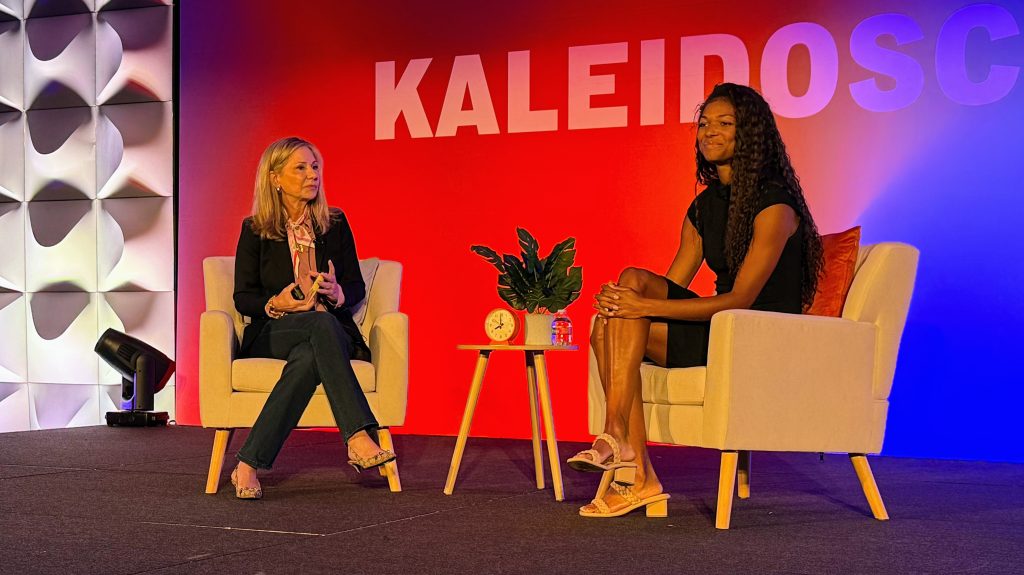
The second day keynote featured an inspiring and entertaining conversation between Olympic sprinter Gabby Thomas and 8am’s chief legal officer Catherine Dawson.
Even so, to both go through a major rebrand and put on a major conference within the span of two weeks is no small feat, and the company deserves credit for successfully pulling off both.
It is worth noting that a customer conference is not just some sort of corporate vanity project. In my experience, a customer conference can offer many legitimate benefits to both the customers and the company.
For customers, they get opportunities to network and share tips with their peers who are also using the products, and to get direct training from the company in how to make the most out of the products.
For companies, they get opportunities to interact with and better know their customers and to get direct feedback from them on what they like or do not like about their products, and what features they wish to see added.
Small But Polished
All of that said, any new conference has to start somewhere, and that somewhere is typically on the smallish, more modest side.
Such was this conference, when judged purely by attendance. The attendance totaled 330, but that number included 75 8am employees (39 of whom were presenters). Of the remaining 255 non-employee attendees, some were from the 12 partner companies that exhibited at the conference, and some others were media, consultants and various others. So the number of actual customers who attended was probably in the range of 200-220.
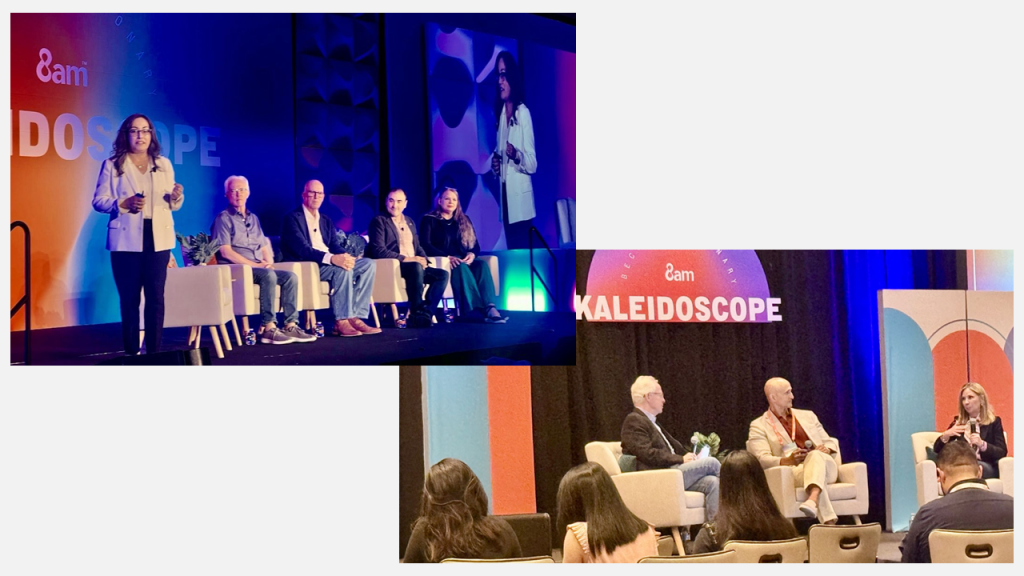
I got to be part of two panels. The first, ‘The Future of Law: Emerging Trends from Legal Tech Experts,’ including my Legaltech Week colleagues Niki Black as moderator, Steve Embry, Joe Patrice and Stephanie Wilkins. In the second, “Running A Business in the Face of Unpredictability,” I interviewed 8am’s chief financial officer Christian Fadel and chief legal officer Catherine Dawson.
When you consider that ClioCon – the conference of one of 8am’s primary competitors, Clio – last year had over 5,000 attendees, including 2,600 in person and the rest virtual, Kaleidoscope’s numbers might seem small.
But, as I said, every conference has to start somewhere. And, frankly, numbers alone do not tell the whole story.
The fact of the matter is that Kaleidoscope came across as highly polished and professional, virtually devoid of rough edges. From the venue to the programming to the food and socializing, it had the sheen and refinement of an event put on by an experienced crew.
From Boots to Bashes
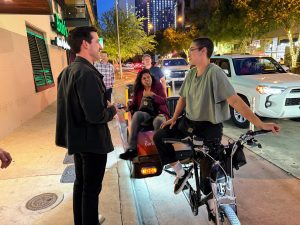
LawNext’s Ben Ambrogi chats with a pedicab driver as 8am’s SVP of application engineering Daisy Itty looks on.
Among the nice touches that made this feel so polished and professional:
- A diverse and well thought out array of programming. Thankfully, this was not all AI all the time. While that topic was certainly covered, programs spanned a variety of subjects of interest to solo and small firm lawyers (along with some for the company’s accounting customers).
- Free cowboy boots! Free Tecovas cowboy boots were promised to the first 50 registrants. It seemed as if more than 50 ultimately were able to take advantage of that offer. Either way, Tecovas was there on site in a “boot corral” to fit attendees with their new boots. And, yes, I now count myself among those who are cowboy boot enabled.
- A second-day keynote featuring a conversation with 2024 Olympics gold medal sprinter Gabby Thomas, who was both entertaining and insightful.
- The return of the pedicabs. Last year when ClioCon was in Austin, 8am (then still AffiniPay) made an inspired guerilla marketing move by providing branded pedicabs to whisk ClioCon attendees to its own alternative party. At Kaleidoscope, the pedicabs were back to take attendees out for a night on the town.
- Support for charity. An 8am Cares table at the conference raised over $10,000 for the Ronald McDonald House charity.
- Various networking events, including a closing night party at an Austin club with live music and line dancing.
Those of us attending as media also appreciated the dedicated media “green room” where we could work on our stories, as well as the dedicated podcast room, complete with professional audio and video equipment and the technicians to make it all work.
Where Was ‘I’?
However, that is not to say everything was perfect. If there was one standout glitch, it was the case of the missing “i.”
Graphics throughout the conference, including the stage backdrop during many of the presentations, boldly proclaimed, “Become a visonary.” Unfortunately, some poor graphics person had lacked the vision to see the missing letter.
But the company turned adversity to opportunity, exploiting the omission with humor and humility, and giving the opening keynote speaker Leslie Witt, the company’s chief product officer, her Oprah moment.
“What I’d like you to do,” Witt invited the keynote audience, “is take a look underneath your seat, and for one lucky person, you may find something there.”
Sure enough, one person did, and what he found was the missing “i” – or at least a facsimile thereof – winning him a gift certificate of $600.
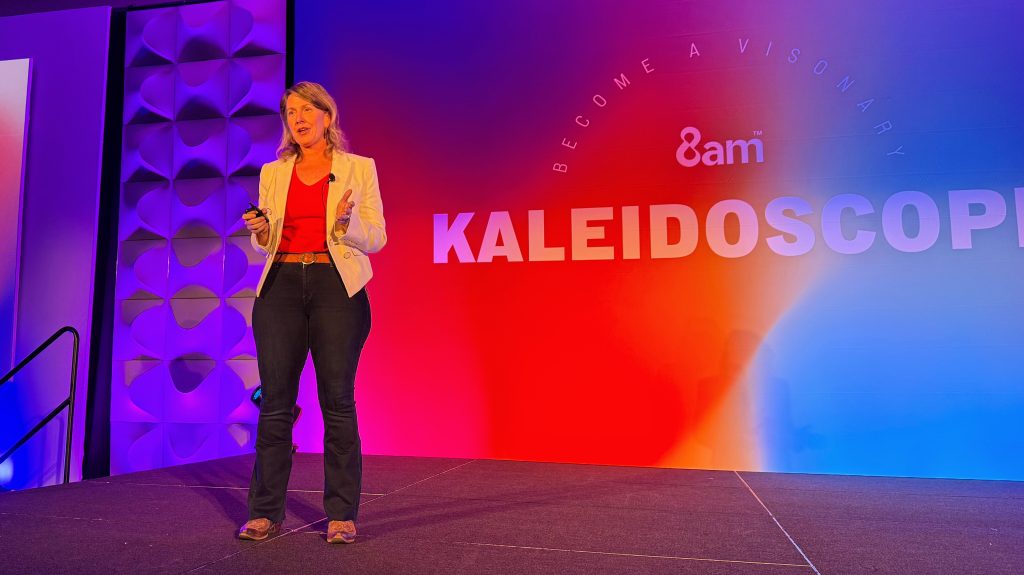
Chief Product Officer Leslie Witt got her Oprah moment thanks to the missing “i” in “visonary,” which you can see on the backdrop behind her.
A greater oversight, to my mind, was the lack of healthy food. I get it, this was Texas, and Texans like their meat – especially their barbecue. But we live at a time in which many people – I among them – try to eat healthy.
Food was ample in quantity, with breakfast and lunch provided as well as mid-morning and mid-afternoon snacks. But the meals had only limited options for vegetarians, and the snacks favored donuts and cookies over healthful alternatives.
(I’ll admit, trapped in this health food desert with no easy way out, I was forced to sample said donuts, which, for something that was poisoning my body, turned out to be surprisingly tasty.)
CEO Unable to Attend
One other element missing from the conference was its chief executive officer Dru Armstrong. In a pre-recorded video at the conference’s opening, she welcomed attendees and then said, “I wish I could be there with you this week, but I’m unable to attend because of some personal circumstances.”
I’ve had the opportunity to interview and speak with Dru on many occasions, and I can tell you she is the kind of dynamic leader whose presence would have been a further boost to the conference. Her absence cast a slight pall over the otherwise buoyant atmosphere. Based on what I know of Dru, those personal circumstances must have risen to the level of Texas wild horses to have kept her away.
Related: On LawNext: AffiniPay CEO Dru Armstrong on the Intersection of Fintech, Legal Tech and AI.
Getting Back to Déjà Vu
All of that said, the success of a conference ultimately has little to do with the attendance numbers or the food choices or the polish of the production. What makes or breaks a conference is the intangible energy that pervades it – the vibe, if you will.
And here, for me, is where that sense of déjà vu kicked in. The reason I felt at Kaleidoscope as if I’d been there before was because I had once been somewhere with a very similar vibe, the very first ClioCon back in 2013.
Even though ClioCon is now one of the largest legal tech conferences in the world, it, too, started small, and the parallels between it and Kaleidoscope were many.
That first year of ClioCon had roughly the same attendance as this first year of Kaleidoscope. It, like Kaleidoscope, fit within a fairly modest space within a fairly small hotel. It, like Kaleidoscope, had just a handful of exhibitors, with small, uniform booths arranged in an open hallway area.
But even with those modest beginnings, ClioCon always stood out – and the reason it stood out was its energy, its vibe. As I wrote after the second ClioCon:
“The solo and small-firm lawyers at this conference … all seemed charged about their practices and their prospects. They seemed eager to take in new ideas and brought plenty of their own ideas. As much went on outside the seminar rooms as in them.”
It was conference that was modest in size, but big in impact. And that it why it has continued to grow year after year to the colossal conference it is today.
In much the same way, Kaleidoscope felt bigger and more vibrant than the attendance numbers would suggest.
On the Cusp
I am sure 8am has no desire for its conference to be compared to the conference of one of its major competitors. But the déjà vu I felt in Austin was because the conference’s overall atmosphere – its energy and vibe – was strongly reminiscent of that very first ClioCon.
And that is a good thing.
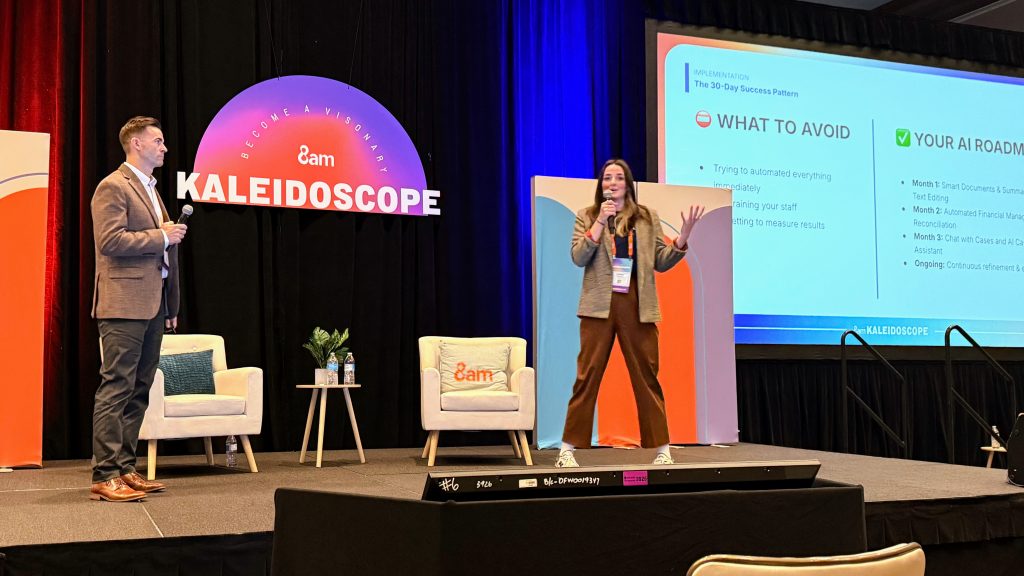
Josh Carter, senior product manager, and Lindsay Bushong, manager of solutions consulting, gave a preview of the company’s new 8am IQ generative AI features.
At that first ClioCon, there was a strong sense that we were at the cusp of something big, at the beginning of a new generation of law practice and technology for solo and smaller firms, driven in part by the advent of the cloud.
And at Kaleidoscope, there was a similar sense of being on the cusp of something new, only this time the “new” had more to do with generative AI and its potential to transform the business and practice of law for solos and small firms.
The lawyers and law firm professionals I spoke to there were explicit about it: Many said they had come to the conference specifically to learn more about AI and what it means for them. Some told me they were just starting to explore AI, but eager to get up to speed.
Even beyond AI, there seemed to be a strong sense of excitement among attendees about technology and its potential impact on their practices.
Kaleidoscope’s first outing proved that 8am can put on a professional, well-run conference with an energy that belied its modest size. The company is already planning a second Kaleidoscope next year.
Much to my regret, it will be in Las Vegas, which I do not like as a conference location.
But, location aside, if it continues next year to build on this year’s momentum, this debut may come to be remembered as the foundation of an enduring annual event on the legal tech calendar.
As Yogi Berra might have said had he been there last week, when it comes to Kaleidoscope, the déjà vu is worth doing all over again.
 Robert Ambrogi Blog
Robert Ambrogi Blog


